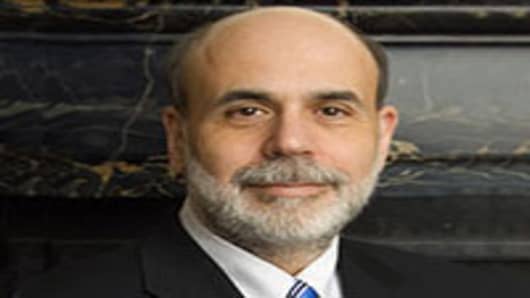Faced with a deteriorating economy, Federal Reserve Chairman Ben Bernanke has indicated he is open to congressional and White House efforts to develop a rescue package to avert a recession.
The fragile state of the economy has gripped Wall Street and Main Street and is a rising concern among voters. The situation has galvanized politicians -- including those vying to be the next president -- and poses the biggest test to Bernanke, who took over the Fed nearly two years ago.
Much attention will be focused on Bernanke's testimony Thursday before the House Budget Committee for insights into what can be done to help blunt the ill effects of a deep housing slump and a credit crisis. The big worry is that those problems will force consumers to clamp down on their spending and businesses to put a lid on hiring, sending the economy into a nosedive.
CNBC.com will air Bernanke's testimony live beginning at 10 am New York time.
Joint Economic Committee Chairman Sen. Charles Schumer, D-N.Y., said he had spoken with Bernanke on Monday and that the Fed chairman was "generally supportive" of lawmakers and Bush passing a stimulus bill.
"He said that while he wasn't going to endorse a specific plan, if an economic stimulus package was properly designed and enacted so that it enters the economy quickly, it could have a very positive effect on the economy," Schumer said.
With the economy suffering, one of President Bush's first acts after returning to Washington Wednesday evening from the Middle East was to be a conference call Thursday with congressional leaders in both parties to discuss a possible short-term stimulus package.
Pledge to Slash Rates
For the Fed's part, Bernanke pledged last week to aggressively slash a key interest rate as needed to bolster the economy. Many economists believe the Fed will lower its key rate, now at 4.25 percent, by a bold half-percentage point at its next meeting on Jan. 30. The Fed cut rates three times last year, starting in September. But some critics on Wall Street and elsewhere have been critical of Bernanke for not taking action sooner and more forcefully.
Last week, Bernanke signaled he was open to additional help from the Democratic-controlled Congress and the White House, which are exploring economic stimulus packages, that could include tax rebates.
"I'd like to see what emerges from the process, and I look forward to talking with and discussing with proponents some of the various options that might be put on the table," Bernanke said in a Q&A session after speaking in Washington on Jan. 10.
House Speaker Nancy Pelosi, D-Calif., and Republican leader John Boehner of Ohio emerged from a rare meeting on Wednesday promising to craft legislation to energize the weakening economy.
Although Republicans and Democrats differ over what provisions should be part of any such package, there's widespread agreement that tax rebates along the lines of the $300-$600 checks provided in 2001 are likely to part of the measure. The country last suffered a recession in 2001.
A recent string of dismal economic reports has raised fears the country could slide into a recession this year. Retail sales have plunged. The nation's unemployment rate has jumped from 4.7 percent to 5 percent, a two-year high. Manufacturing activity has slowed. The nation's major banks are piling up big losses and Wall Street has been mired in turmoil.


